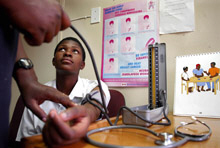
Typical street scene in Santa Ana, El Salvador. (Photo: iStock)
IMF Survey: Africa Needs More Spending on Health, IMF Tells Panel
September 2, 2008
- African health spending up marginally to average of 1.8 percent of GDP in 2007
- Increasing health spending alone not enough to achieve better health outcomes
- Adequate financing also needed for related sectors such as water, sanitation
Africa needs a significant increase in spending on health, IMF Deputy Managing Director Murilo Portugal told an international conference in Accra, Ghana.

Clinic in Manzini, Swaziland: many countries have scope to generate extra revenues for health spending (photo: Eric Miller/Picturedesk International)
AID EFFECTIVENESS FORUM
Speaking in a panel discussion on financing of health sector interventions at the Third High Level Forum on Aid Effectiveness, he noted that health spending in Africa had "only increased marginally" from an average of 1.6 percent of GDP in 2000 to 1.8 percent of GDP in 2007.
"The IMF is in favor of increasing spending for priority sectors, including health," Portugal said September 2, adding that higher health spending is important for meeting the Millennium Development Goals, three of which are health related.
Portugal stated that public spending on health is low in low-income countries, especially in Africa. He added that spending totals often do not aggregate all health-related expenditure, as much health spending is off budget.
Portugal said creating sustainable fiscal space for priority spending has been a key element of the IMF's policy advice in recent years. Countries have several options for creating fiscal space for priority spending.
• In many countries there is scope for mobilizing additional domestic revenues.
• Resources can be shifted from less productive areas such as untargeted subsidies or unproductive activities of the civil service.
• Additional borrowing.
• Increased external financial assistance, which is why aid predictability is so important.
Increasing health spending on its own is not sufficient to achieve better health outcomes, Portugal stated. Improved health outcomes are driven by complex factors such as female education, which influences infant mortality and fertility rates. Improvements in water and sanitation are also critical for better health outcomes.
"Therefore, when we advocate additional financing for health, we should also call for adequate financing for these complementary sectors without which our ultimate objective of improving health outcomes may remain unrealized," Portugal told the panel.
Predictable aid flows
Ministers from over 100 countries, heads of international financial institutions, donor organizations, and civil society organizations from around the world were attending the Accra meeting.
In months of preparation for the September 2-4 event, the IMF staff has worked with others to help define a consensus on the meeting agenda, in particular stressing the need for predictable aid flows
The Accra meeting comes at a crucial moment: it is just past the midpoint to the 2010 target date set by the Paris Declaration on Aid Effectiveness, and halfway toward the 2015 deadline for reaching the Millennium Development Goals (MDGs) set by the United Nations.
Besides reviewing advances in, and assessing obstacles, the High Level Forum aims to broaden the aid effectiveness dialogue to newer actors and chart a course for strengthening the aid effort.
Curb on wage bill ceilings
Portugal reassured delegates that the IMF has sharply reduced use of wage bill ceilings in its programs.
"Following the new policy approved by our Executive Board in July 2007, wage bill ceilings will be used in Fund-supported programs only when justified by macroeconomic considerations and where capacity of governments to control such spending is particularly weak, such as in post-conflict situations," Portugal said. "The Fund has already moved in this direction. Currently, not a single IMF-supported program under the Poverty Reduction and Growth Facility (PRGF) have wage-bill ceiling as "performance criteria." Only 3 out of 23 such programs include wage-bill ceilings as `indicative targets'," he added.
Previously, critics had claimed that caps on public sector wage bills had stopped low-income countries from using donor resources for expanding employment in key poverty-reducing sectors, like health and education. But the IMF has made it clear that wage bill ceilings should only be used if there is a clear justification.
Comments on this article should be sent to imfsurvey@imf.org


